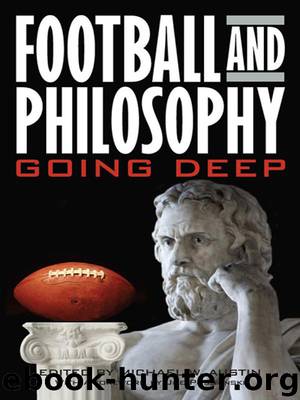Football and Philosophy by Michael W. Austin

Author:Michael W. Austin
Language: eng
Format: mobi
Publisher: The University Press of Kentucky
Published: 2013-03-24T10:28:44+00:00
In what follows, I attempt to flesh out Aretism as a modified version of Stoic ethics. The idea here is to give not just an ethics of sport, but an ethics of life that is respectful of competitive sport as a valued social practice.
Stoic Balance: Ethics for Sport and Life
The Stoic philosopher Chrysippus (280–207 B.C.) speaks of virtuous activity in life as a competitive footrace: “When a man enters the footrace …it is his duty to put forth all his strength and strive with all his might to win, but he ought never with his foot to trip or with his hand to foul a competitor. Thus, in the stadium of life, it is not unfair for anyone to seek to obtain what is needful for his own advantage, but he has no right to wrest it from his neighbor.”14 For Chrysippus, virtue entails that one may compete for the first prize in life, so long as one does not trip or shove competitors along the way. This is, in effect, the Stoic notion of oikeiosis.
Oikeiosis for the Stoics was a matter of achieving a balance between self- and other-concern in life.15 One strives to help others but does not need to sacrifice completely one's own interest to do so. In all actions, even other-regarding actions, one's own interest must be considered too, because one is as much a part of the cosmos as is any other person. In other words, one's own interest impacts the interests of others. One must not, however, secure one's own interest to the detriment of another. Cicero states it thus: “For one person to deprive another in order to increase their welfare at the cost of the other person's welfare is more contrary to Nature than death, poverty, pain, or any other thing that can happen to one's body or one's external possessions. To begin, it destroys human communal living and human society. If we are each about to plunder and carry off another's goods for the sake of our own, then that will necessarily destroy the thing that is in fact most according to Nature—namely the social life of human beings.”16
Yet oikeiosis for Stoics is more than just a matter of respectful competition with others, where “respect” is cashed out as refusal to harm another while competing. It embraces Stoic egalitarianism, other-concern, and global culpability. Virtue through oikeiosis implies that one knows fully well what is one's own and what is not one's own—that is, what is another's—and that seems a clear statement not only of self- and other-knowing but also of self- and other-concern. The virtuous athlete competes to the best of his ability, but he does so with full respect for himself, other competitors, and the sport that he plays.
Download
This site does not store any files on its server. We only index and link to content provided by other sites. Please contact the content providers to delete copyright contents if any and email us, we'll remove relevant links or contents immediately.
| Anthropology | Archaeology |
| Philosophy | Politics & Government |
| Social Sciences | Sociology |
| Women's Studies |
The remains of the day by Kazuo Ishiguro(9000)
Tools of Titans by Timothy Ferriss(8396)
Giovanni's Room by James Baldwin(7347)
The Black Swan by Nassim Nicholas Taleb(7130)
Inner Engineering: A Yogi's Guide to Joy by Sadhguru(6796)
The Way of Zen by Alan W. Watts(6614)
The Power of Now: A Guide to Spiritual Enlightenment by Eckhart Tolle(5784)
Asking the Right Questions: A Guide to Critical Thinking by M. Neil Browne & Stuart M. Keeley(5775)
The Six Wives Of Henry VIII (WOMEN IN HISTORY) by Fraser Antonia(5515)
Astrophysics for People in a Hurry by Neil DeGrasse Tyson(5190)
Housekeeping by Marilynne Robinson(4449)
12 Rules for Life by Jordan B. Peterson(4305)
Ikigai by Héctor García & Francesc Miralles(4275)
Double Down (Diary of a Wimpy Kid Book 11) by Jeff Kinney(4273)
The Ethical Slut by Janet W. Hardy(4256)
Skin in the Game by Nassim Nicholas Taleb(4250)
The Art of Happiness by The Dalai Lama(4130)
Skin in the Game: Hidden Asymmetries in Daily Life by Nassim Nicholas Taleb(4007)
Walking by Henry David Thoreau(3963)
